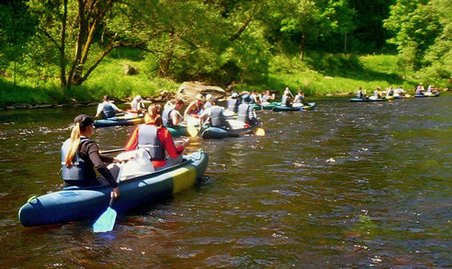We’d all agree with these sentiments, wouldn’t we? Like all those other non-negotiable ‘givens’ like ‘vibrancy’, ‘enrichment’ and ‘diversity’, who could possibly object? In this case there is, apparently, very little cause for cynicism. The consultation appears to be sincere, genuine and for the general good – but authorities do have a habit of ignoring those pesky issues that just won’t go away…
They are seeking views on:
1) Ways to reduce the costs and burdens associated with administering public paths and wider access
2) How they can better meet current and future recreational needs
3) Ways to tackle some of the practical difficulties of improving opportunities for all, not just for those who can afford to travel or those who are already enthusiastic about an activity.
No.2 could be partially accommodated if the Powers-That-Be would only recognize the largely unnecessary conflict between casual canoeists (mostly holiday-makers) and anglers on the Upper Wye who must buy both a licence to fish and a permit for a particular stretch of river. It must be acknowledged that the great majority of casual canoeists seek the same peace and solitude as the angler; they too want a slice of contentment in the natural beauty of Wales and they go about their recreation in a civilized manner. But – inevitably – there are the wreckers. In recent times, a swan has been stoned to death at Llowes and a tethered fishing-boat set adrift (it was found 5 miles downstream) Rock-throwing, too, is a popular pastime – particularly when it’s done close to an angler. There’s the usual litter problem though the majority of canoeists are tidy and conscientious.

Not an ideal spawning environment…
But basically, the two activities are incompatible and they always will be, but where there is NO RIGHT OF NAVIGATION – as is the case on the Upper Wye above Hay Bridge, the problem can be stopped in its tracks. All it needs is for the Environment Agency (surely) to decree the upper river out of bounds for canoeists! Below Hay, there does exist a right of navigation, and from here canoeists can legally launch their craft and paddle all the way out to sea via the Bristol Channel.
Compelling canoe-hire companies to transport their craft and customers down to Hay would not be welcomed by those businesses and it would increase the burden on the river downstream of Hay – but it would be legal and it would ‘free-up’ the shallow ‘redds’ of the upper river for successful salmon spawning. When all is said and done there are simply too many canoes allowed on the river.
This has been an issue for years and years but no one authoritative body has been prepared to make a stand. Many with a professional interest in the Wye Valley would cite tourist-income and fairness-for-all as a reason for doing nothing: probably, the former premise has won every time. But there’s money in fishing! Imagine the resurgence within the hospitality industry… the increase in angling permit sales…the reappearance of tackle shops… The commercial aspect of any major policy-shift would adjust with no discernable change or, very possibly, for the better: game anglers in particular are prepared to pay for their sport and would provide a great incentive for the EA to promote the return of the salmon.
So, FM readers…why not respond via the link below, or write a short piece explaining your position on this contentious subject? It’s not purely a Wye problem so any non-copyright material that favours the angler will be welcomed by the ‘net’.
HOW TO RESPOND
Please submit your comments by 02 October 2015, in any of the following ways:
AccessandOutdoorRecreation@wales.gsi.gov.uk
POST
Landscape and Outdoor Recreation Branch
Economy, Skills and Natural Resources Group
Welsh Government
Aberystwyth
Ceredigion
SY23 3UR
ADDITIONAL INFORMATION
Any response you send us will be seen in full by Welsh Government staff dealing with the issues which this consultation is about. It may also be seen by other Welsh Government staff to help them plan future consultations.
The Welsh Government intends to publish a summary of the responses to this document. We may also publish responses in full. Normally, the name and address (or part of the address) of the person or organisation who sent the response are published with the response. This helps to show that the consultation was carried out properly. If you do not want your name or address published, please tell us this in writing when you send your response.










